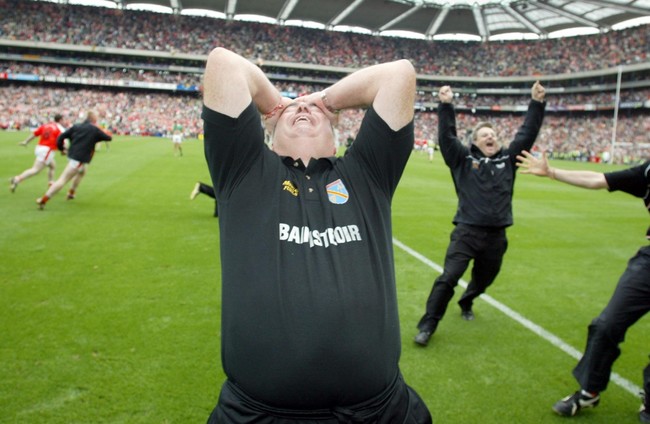This article is a part of Genius Week, a series of features reflecting on sporting genius in its many different forms.
Here, Garry Doyle takes a closer look at Joe Kernan’s influence as Armagh came from behind to claim their only All-Ireland in 2002.
OISIN MCCONVILLE SAT in the Croke Park dressing room with his head in his hands. It was All-Ireland final day, 2002, Armagh trailing Kerry by four points; the same margin that separated these sides when they met in the 1953 decider.
In Armagh, Bill McCorry was the name attached to that 1953 final and while we knew McCorry missed a penalty that day, we didn’t know anything about the background sounds, the sneers, the what-ifs. But McConville had lived with those stories all his life and now here he was, inheriting the curse. Like McCorry, he too had failed to convert a penalty against Kerry in an All-Ireland and a lifetime of regret lay ahead. “Had we lost, I would have emigrated,” he said.
But they didn’t lose. Their team was too good, their cause too great, their manager, Joe Kernan, too smart. Are we being overly generous to call Kernan a genius? “I don’t think you are,” McConville says in reply. The forward was so much more than a mere eyewitness to history, there when Kernan guided Crossmaglen to three All-Ireland club titles, there when a century of hurt was wiped away in ’02.
At half-time, however, with Kerry four points clear and McConville staring at his palms, there was doubt. Fear and doubt.
Kernan sensed it, keeping a close eye on his free-taker, knowing the wisest policy was to leave him alone. In any case, there was a tutorial to deliver.
Much has been made of Kernan’s piece of theatre during the half-time interval of that final, when the Armagh manager whipped out his 1977 loser’s medal and chucked it into the showers. “Is this what you want?” he asked them, “a medal that means nothing to you?” The dramatics certainly had an impact but so too did the measured words he’d said earlier, the tactical tweaks that would change the course of that All-Ireland.
Their statistical analyst had identified how Kieran McGeeney, Armagh’s captain and playmaker, hadn’t received enough possession in the first-half. Kernan – and his clever assistant, Paul Grimley, pointed out a few positional moves to correct that particular flaw.
There were other changes. Kick-out strategies and set-plays were still in their infancy in 2002 but Armagh had honed their policies from earlier in the season, perfecting their drills during a training week in La Manga.
“Those La Manga days proved to be a turning point,” McConville says. “This is no joke but when our bus pulled into the resort, Real Madrid’s team coach was pulling out. When we sat down for a meal and the restaurant manager said our menu was the exact same as Real’s, it added to the sense of professionalism. We’d gone there to train but each and every one of us had a shirt and a pair of jeans packed away, thinking at some stage we’d have a night out. We never did. The relentless professionalism of the whole week stayed with us.”
It was in La Manga where they’d honed their tactic of explaining how McGeeney would double up as playmaker and sweeper, a novel enough concept in 2002; La Manga where English rugby’s kicking guru, Dave Alred, worked with McConville and the goalkeepers on their kicking routines; La Manga where their set-play plan was formalised. “From sidelines, we had a habit of wasting too much possession,” McConville says. That stopped. A carefully orchestrated ploy was put in place; a rotational movement that invariably led to the second runner receiving possession. “That summer we’d get loads of points from a simple enough play, Dairmuid (Marsden) often getting on the end of them.”
Yet for the previous 35 minutes of that September afternoon, they’d scored just seven times, McConville’s penalty in danger of becoming the game’s defining moment. Yet it wouldn’t be.
When he was in charge of Crossmaglen, Kernan had a habit of bringing in outside experts to provide the players with a fresh voice. Colm O’Rourke was a visitor in 1997, Sean Boylan invited to speak with the players a couple of years later. In McConville’s eyes, O’Rourke’s presence on the sideline for the ’97 final was yet another example of Kernan’s ability to sacrifice his ego for the overall good. “That’s what was great about Joe, he never gave a shite who got the kudos, he just thought, let’s get the job done,” says McConville.
So here he was again, trusting outsiders to offer their expertise. Sports psychologists weren’t a new thing in GAA dressing rooms – Derry had one in ’93, Galway in ’98 – but they were new to the Armagh set-up. And they were badly needed. Across the previous three years, they’d thrown away winning opportunities against Meath, Kerry and Galway, the eventual All-Ireland winners.
“We’d a hang-up about winning in Croke Park because we hadn’t done it,” McConville says. “So for us, the (All-Ireland semi-final) win over Dublin was a big thing. It was only by a point (Ray Cosgrove missed a last-second free to bring the game to a replay) but it was a win at HQ, the end of a journey rather than the end of the journey. After that, we knew we could win Sam.”
That message was delivered to the players at half-time, too. “Look these days, people can be awful snobby about rousing speeches but once there is substance behind them, they can work, absolutely they can.
“The thing is we got it all. We analysed the stats; we made tactical changes. Like, Kerry scored only three points in that second-half. That wasn’t just the result of a brilliant half-time speech. We’d looked at the way they were getting space and we corrected the flaws in our system. Everything had an effect. When Joe threw his 1977 losers medal into the showers and said ‘you don’t want something like that’, that too had an impact. Lots of things contributed to the win.”
No player contributed more that day than McConville, though. After missing the penalty, he ended the game with 1-2, his 55th minute goal changing the direction of the final. Kernan may have had the emotional intelligence to know his ace scorer needed time to process his pain but he also knew that some softly delivered advice would do no harm.
So he nodded at Des Jennings, one of the two sports psychologists working with Armagh that year, to have a word. Taking a ball from the kit-bag, Jennings handed it to McConville and told him to walk onto the pitch and bang it into the empty net before the game restarted. Knowing that 83,000 eyes would be watching him do that, McConville edited Jennings’ advice, kicking it as hard and as high into the sky as he could after re-entering the pitch. “And that was enough for me. I was able to let everything go from that moment on. What Des said worked for me.”
What Kernan said worked for Armagh. They trailed at half-time by four; they ended up winning by one, keeping Kerry scoreless in the last 16 minutes.
Again, the detailed analysis of an earlier game from that summer came good, Kernan and his backroom team pointing out the reasons why they’d played so poorly in their drawn quarter-final game against Sligo at Croke Park. “We were guilty of focusing on the result instead of just doing the basic things to get the result,” McConville says.
Remember this was 18 years ago, the early days of teams thinking about playing matches on a play-by-play basis. “I hate the phrase ‘sticking to the process’,” McConville says, “because it sounds so vacuous. But in 2002, it wasn’t the tired phrase it has since become. It was new. When it was pointed out to us after the Sligo game, it made sense.”
So rather than panic in those nerve-wrecking final minutes, Armagh stayed calm, holding their nerve to deliver a dream. And for McConville the agonies of a penalty miss were quickly forgotten. A day that looked like being the worst of his career ended up as the best.















Barry Daly was particularly unlucky with injuries. A very effective try-scorer.
@Glenbower: would he be worth a shot by Connacht? Seriously depleted in the back 3
@Barra Mac An Bhaird: yes I think he’s a class player annoyed that leinster did not keep was extremely sharp before his injury.
@hypebeast: Totally agree. Great skillset and excellent finisher; I don’t remember him ever making a significant mistake. I prefer him to Kelleher in the back 3. He’d be a very good addition to the Connacht squad.
@Barra Mac An Bhaird: I have a feeling he may be retiring due to injuries
Sad to see Barry Daly is leaving
That’s remarkable work
New contracts for Leavy, connors and VDF…..
@#JUSTICE4NOEL: Maybe now that will put to bed any notions of other provinces scrounging around looking for one of them!
That’s a great mornings business. Delighted Fardy is getting another contract. He brings so much to Leinster. Great to see all the 7’s staying too though Leo has some selection headaches now.
@Kevin: Great to see Fardy stay. A real leader. We might see him in a coaching role in 2 years. 5 players promoted from the academy is a great return also.
Great bit of business, always good to see the academy lads getting senior contracts. Nice to see all the 7s are staying as well as Fardy.
Gutted for Barry Daly. Fastest man in the squad and hugely prolific scorer. Desperately unlucky with injuries, it’s such a shame. Schmidt even had called him into camp at one point.
Any of these players interested in a move West, Connacht getting weaker each year since 2016.
@Pretty Ladee: 2 of the players leaving are going west.
@Chris Mc: connacht need proven professionals not kids,
@Pretty Ladee: didn’t qualify for the Heineken cup 2 years in a row and followed that up by qualifying the next 2 years in a row, doesnt really sound like a decline ?
@Kohn Jeenan: look at this years departures, compared to signings, hardly an achievement qualifying for the heineken cup
@Pretty Ladee: there’s hardly a single player to come through the leinster academy that’s not ready for the pro 14
@Pretty Ladee: we’ve qualified on our own merit for the Heineken cup maybe a few times ever so I’m not sure how you can say it’s not an achievement, departures is kind of worrying but have to presume there’s some plan
@Pretty Ladee: Aungier is a gem of a player and a big loss to Leinster. He will soon be a favourate in the Sportsground
With Joe Tomane departing, I presume Leinster have room to sign another non Irish player, obviously not possible with the current economic situation.
Amazing to think that with Leinster’s academy, they will need nor miss this opportunity!
@Conor Mulloy: a none irish loose head might be the only requirement as healy will be away and is not getting any younger. Saying that it’s a great opportunity for the younger lads to step up.
@Chris Mc: A NIQ loosehead is a good shout. That said, Dooley had upped his game pre-COVID19 and was playing very well.
@Carmine Lorenzo: agree Dooley has stepped up but say going into a HC final and healy was injured dooley and Byrne doesn’t sound as good as healy and mcgrath
@Chris Mc: Nope it definitely does not, a certain drop off there. I guess we’ll find out soon enough whether Milne has what it takes.
@Carmine Lorenzo: if Leo trusts dooley Byrne and milne that’ll do for me.
Def jealous of that
Fantastic strength in depth and who would not want to sign on when the team is on the crest of a wave
Yeah v disappointed for Daly, He’s a VG player when fit
Great business by leinster selection ain’t easy delighted for Vardy
Are we becoming very forward heavy compared to backs. (with ferg and Rob) added to the list that moved on today